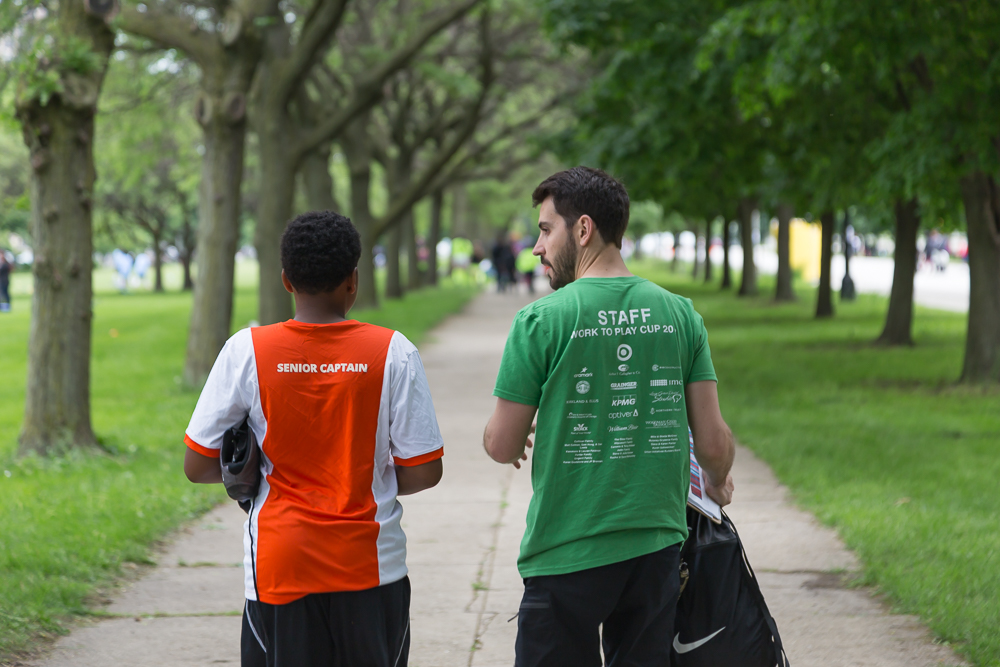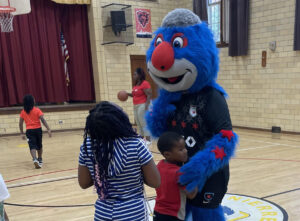While the importance and impact of mentoring continues to echo around lunch tables, meetings rooms, and coffee shops, the methodologies of mentoring have evolved to fit the dynamism and demands of the world today. Now more than ever, mentoring is recognized as a critical driver of achievement and growth across sectors and contexts, prompting increasing pursuit and intentionality directed at mentoring relationships. A mentoring approach is trending as an essential lens in the worlds of parenting, education, and management. To top it off, the first month of every year since 2002 has been proclaimed as National Mentoring Month, leading to an annual invigoration of mentoring efforts and resources.
Urban Initiatives celebrates this commitment and welcomes the opportunity to ensure mentoring is effective in programming. In adapting to the changing needs and wants of youth, Urban Initiatives has employed four innovative elements to mentoring and made these priorities within its programmatic work. Urban Initiatives mentoring is play-based, group-oriented, peer-led, and long-term.
If the imagery of an older soul imparting wisdom to a younger one across a table captures more traditional mentoring structures, then the Urban Initiatives approach is better captured in the imagery of a sports team. Imagine the activity and laughter of the playing field, the cheering network of parents and coaches, the encouragement and direction of teammates, and the opportunity to grow with and through a sport alongside committed coaches and friends. This image serves as an illustration for the four mentoring approaches cemented in Urban Initiatives’ K-12 youth programming and will be a valuable reference in unpacking those four elements.
Play-Based Mentoring
Starting with the play-based element of the Urban Initiatives mentoring approach, the uniqueness and creativity of this approach might strike an observer first. Mentoring just looks different within Urban Initiatives’ work. Instead of being centered on a cup of coffee or a conversation starter, people are drawn together by a ball, a game, or a common goal. This subtle shift utilizes the fun and relationship building power of play to build connections of trust and understanding.
By facilitating the development of mentoring relationships with play-based activities, Urban Initiatives creates a safe space for mentors and mentees, coaches and players to get to know each other, define boundaries, and support each other’s failing and learning. This does not mean that mentoring is all fun and games and there is no time for in-depth goal setting or problem solving, but rather that a play-based approach builds a relational foundation that can support the openness and vulnerability of those more direct conversations. Furthermore, this play-based element emphasizes that all parties are equally involved and invested in the learning that is taking place. Mentoring relationships built through games and play put mentors and mentees on equal footing and require that each and every person take on a posture of learning.
This shared learning potential and value was touted by President Obama in his proclamation of January 2016 as National Mentoring Month, stating, “During National Mentoring Month,…we recommit to building a society in which all mentors and mentees can thrive in mutual learning relationships.”1 Urban Initiatives has seen how a play-based element to mentoring can ensure that there is mutual learning, and we would advocate for all to consider how important the role of play is in the society being built.
Group-Oriented Mentoring
A second critical element in the Urban Initiatives mentoring approach is group-orientation. To help explain this, first imagine the perspective of a young person entering a brand new mentoring program. They may not know many or any of the people in the room, and suddenly they are introduced to a singular mentor match who is supposed to fulfill their needs, hopes, and dreams as it relates to supports of all kinds. That can be a daunting experience when a young person realizes their mentor relationship eggs are all in one basket, so to speak.
This is where the group-orientation of Urban Initiatives’ approach comes in. Even as students are paired with more individualized mentors in their later years, these students have been supported by multiple coaches and volunteers who have gotten to know them in that play-based setting described earlier. This leads to a dynamic where each young person has multiple adult coaches, role models, and mentors before ever getting put in a more intentional match. This has the two-fold impact of ensuring that matches can be made with the knowledge of that student’s particular goals, interests, and attributes, but also that there are multiple supportive relationships already established outside of that match to provide support in the nuanced and multi-faceted ways that honors the uniqueness and individuality of each young person in Urban Initiatives’ programs.
The powerful impact of this group-orientation that encourages many mentor relationships instead of just one is illustrated by one Harvard professor’s research on high-achieving DACA recipients. Roberto Gonzalez found in his research that for high-achieving DACA recipients, “the difference was, the high achievers could name three or more mentors. Mentors who were there for them at crucial times in their lives.”2 A single mentor is important and can make a significant impact, but students are best served when mentor resources and structure can provide multiple layers of support through multiple mentoring relationships.
Peer-Led Mentoring
In addition to prioritizing multiple layers and touch points of relationship, Urban Initiatives also emphasizes the importance of peer-led mentoring. It can be a trap in mentoring to only consider adults as having mentoring capacity. In fact, Urban Initiatives believes quite the opposite, that there are certain mentoring impacts and insights that are only possible through peer mentors. This is demonstrated in Urban Initiatives’ model of empowering young leaders to be mentors to their peers who are in the life stage alongside or just below them. Once students reach middle school, they have a responsibility to their younger peers to be there for them, providing positive modeling and direct advice. Where an adult mentor may have to take many months building relationship and getting a point through to a young person, younger peers often have a more immediate understanding and relevant delivery of practical wisdom that can make all the difference for a young person hearing the counsel they need.
Long-Term Mentoring
Finally, Urban Initiatives mentoring is designed to be a marathon not a sprint. Both in structure and in relationship, Urban Initiatives believes that mentoring needs to be long-term. Consider all the variables that exist in a young person’s life between the ages of 5 and 18. There are too many changes to track. In the midst of all of that change, consistency of mentors matters a great deal and can provide a crucial lifeline when all else might be new or changing.
As alluded to earlier, the relationship between a mentor and mentee can take many months and even years to develop to a point of trust and understanding. Once that investment is made, it is critical that the commitment is maintained in order to truly reap the return on that investment in terms of depth of conversation and life planning and support.
This is a very intentional concluding point regarding the importance of the long-term commitment to mentoring because this is not just a conclusion but also a charge. With a strategy as tested, tried, and true as mentoring, this January’s celebration of National Mentoring Month should re-inspire action and mobilization on behalf of young people. Take a moment to consider involvement in and support of innovation in mentoring through this play-based, group-oriented, peer-led, long-term mentoring approach. However, do not stop there and run the risk of confining passion for mentoring to just one month this year. Rather, take advantage of every moment that this year affords to make a difference in the lives of the next generation by being a powerful mentor who in turn inspires other mentors at all stages and ages.



